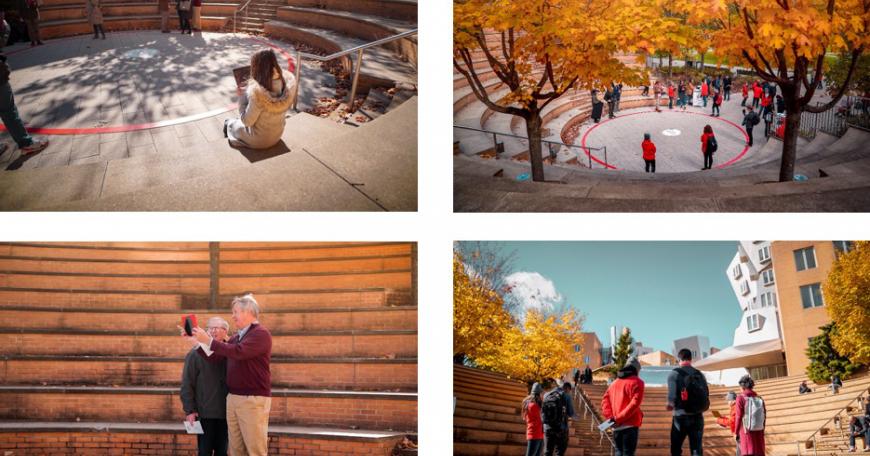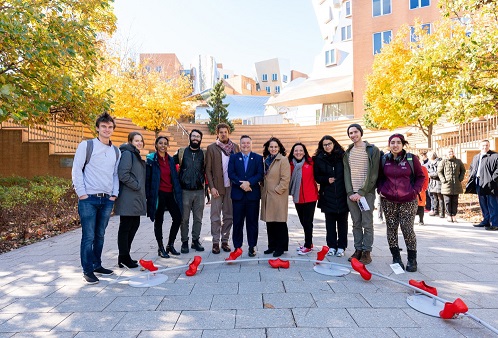
Immersive AR Installation Promotes Empathy for Boston’s Homeless
A recent study from Weber Shandwick found that 94% of Americans consider themselves respectful, but only 24% of those surveyed believe that others show them respect. Santander and a Boston Area nonprofit called Heading Home set out to start a conversation about how empathy can build respect, by using augmented reality (AR) installations, hosted by MIT.
People passing through Boston’s Copley Square, The Greenway, and MIT campus in late October may have noticed clusters of red shoes,

Cambridge Mayor Marc McGovern and MIT Professor Fox Harrell with the Santander and Heading Home teams at the MIT "In Someone Else's Shoes" installation
accompanied by individuals holding smart tablets. Those who stopped to look at these installations were given the chance to be immersed in an augmented reality (AR) experience, meant to promote empathy and respect for Boston’s working homeless population.
An ambassador stood by each set of Santander-red shoes, waiting to hand pedestrians a tablet and guide them through their AR experience. Participants met and were immersed in a series real-life situations facing “Jen,” a full-time nurse’s assistant, who is living out of her car.
Dr. D. Fox Harrell, Professor of Digital Media & AI in MIT’s Computer Science and Artificial Intelligence Laboratory (CSAIL) and the Comparative Media Studies/Writing Program, helped organize the exhibition of the installation at MIT. His research at MIT explores how interactive narratives and virtual, mixed, and augmented reality technologies can impact cognition, learning, and social change. His latest initiative is the Center for Advanced Virtuality, incubated within MIT Open Learning, researches and innovates new models for ethical and artful applications of virtual, augmented and mixed reality in learning environments.
Once participants completed their AR experience, ambassadors invited them to download a pedometer that would track their steps for up to three days. Santander donated $10 per mile walked with a goal of raising $200,000 for Heading Home, which has been working to end homelessness in Great Boston for over forty years.
The funds raised from this project will go toward the rent, security deposits, and emergency management funds of over 200 individuals and families in the Boston Area, according to Danielle M. Ferrier, Chief Executive Officer at Heading Home. However, raising funds isn’t the only objective of “In Someone Else’s Shoes.” Michael Cleary, co-president of Santander Bank, stressed that these installations highlight the ways in which a larger conversation can build respect and empathy.
MIT Professor Fox Harrell hopes that AR technologies can help keep that conversation going. He believes, “It is possible to powerfully and expressively use XR technologies to convey how social phenomena such as homelessness, discrimination, and social mobility function in systematic ways -- Santander’s project is an example of this because it engagingly blends the prosocial and technical potentials of AR.

